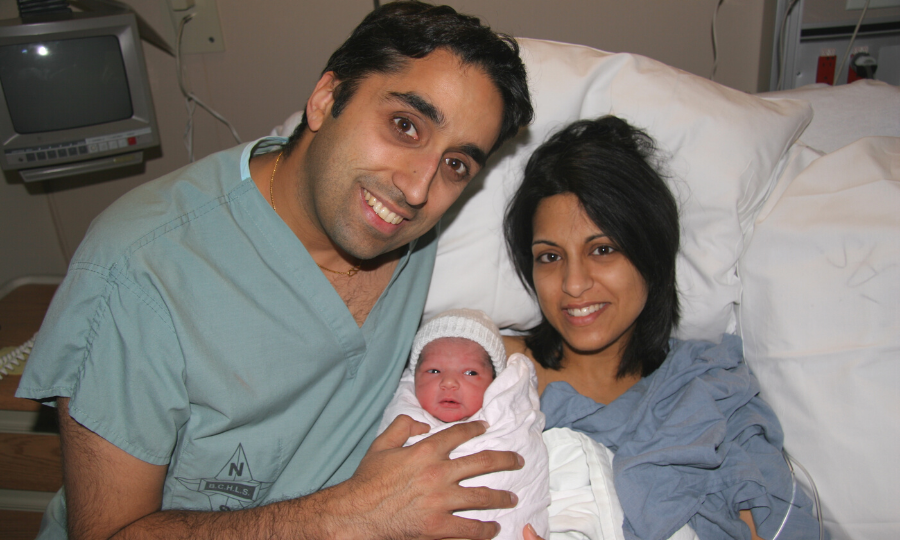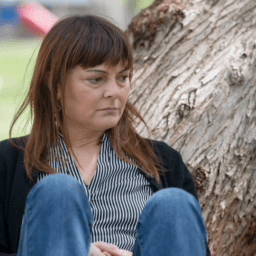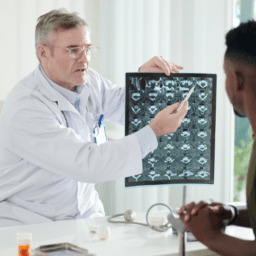Written by Soania Mathur, MD, a member of the Davis Phinney Board of Directors
“You have young onset Parkinson’s disease.”
Not the words I was expecting to hear at the age of 28, having just completed my residency in Family Medicine and expecting my first child. As my pregnancy progressed, along with the morning sickness and the fatigue, I struggled with a worsening tremor which initially had been intermittent and confined to my right pinkie finger but now had progressed to a continuous shake in my entire hand. And along with the expected feelings of fear and excitement of becoming a new mother, I had to contend with the burden of this diagnosis of a progressive, neurodegenerative, incurable illness.
As a physician, I had access to the latest research results and expert advice, yet when I investigated what I could expect either with my pregnancy, delivery, or the health of my newborn, I was shocked by the lack of knowledge in this subject. There was no consensus to guide me about which medications were likely to be safe or what risks I or my medical team had to be aware of and precautions that needed to be taken. I would like to say that there was an increase in the breadth of knowledge over the six-year period that I had two more daughters, but that was not the case. In my first pregnancy and delivery, I followed the normal prenatal protocol, and I was not treated as high risk. Yet for my second, I was seen by a genetics specialist, and then was followed more closely by my obstetrician with serial ultrasounds; once it came time to deliver, there were extra staff in the room including a neonatologist to look after the newborn and any potential complications. My third was much like my first. Thankfully all of them resulted in the uncomplicated births of three healthy, lovely daughters.
 It was very apparent to me that the basis for these inconsistencies in my prenatal and birth care was that my doctors just didn’t know the answers to the questions of risk and what to expect. Parkinson’s presents before the age of 40 in about 5% of cases, making pregnancy post-diagnosis fairly uncommon. But for those of us who do add to our family following a diagnosis of YOPD, we worry about the effects of Parkinson’s or the medications we take on the health of our baby and how our symptoms will respond to the new demands that pregnancy places on our bodies. Many questions come to mind.
It was very apparent to me that the basis for these inconsistencies in my prenatal and birth care was that my doctors just didn’t know the answers to the questions of risk and what to expect. Parkinson’s presents before the age of 40 in about 5% of cases, making pregnancy post-diagnosis fairly uncommon. But for those of us who do add to our family following a diagnosis of YOPD, we worry about the effects of Parkinson’s or the medications we take on the health of our baby and how our symptoms will respond to the new demands that pregnancy places on our bodies. Many questions come to mind.
How will my pregnancy affect my Parkinson’s?
Not much research has been done to address this potential issue, but there have been a few observational studies that give us some information. The reports are conflicting, with some women reporting their Parkinson’s symptoms were stable and some, approximately 50%, reporting that their condition worsened during the course of pregnancy. Although many returned to their expected baseline after birth, others reported a deterioration in their condition that did not improve. Part of the worsening during pregnancy may be based on the fact that many women choose to be unmedicated, forgoing sustained symptom control for what they believe is reduced risk to their unborn child. Our metabolism also changes during pregnancy, which may change the way the medications work and rendering them less effective. The physical and psychological stress that one naturally incurs during pregnancy may also worsen symptomatology.
How will my Parkinson’s affect my pregnancy?
Women with Parkinson’s don’t seem to have any issues with fertility, conception, and the birthing process. A Parkinson’s diagnosis should not dictate the delivery method, and there doesn’t seem to be any major delivery complications such as increased bleeding. Nor does Parkinson’s alone seem to result in major birth defects.
 Which medications are safe during pregnancy?
Which medications are safe during pregnancy?
Of the Parkinson’s medications, levodopa use in pregnancy has been most extensively documented. From those observations, it seems that this is an acceptable medication for Parkinson’s during pregnancy. No significant increases in risk for spontaneous abortion or birth complications were observed, nor did there appear to be any increased risk for major birth defects in babies born whose mothers were taking levodopa.
Other medications such as dopamine agonists, COMT inhibitors, and MAO-B inhibitors do not have sufficient data to make any recommendations regarding their use during pregnancy. Amantadine has evidence of teratogenicity, or harmful effects on the fetus, and therefore is not recommended for use during pregnancy.
What are some of the lingering unknowns about pregnancy and Parkinson’s?
The one question whose answer is not in doubt is whether more research needs to be done into this area. Like most women’s health issues in Parkinson’s, there are few certainties. It may not be a challenge that many people with Parkinson’s face, but it is an important life event that physicians should be prepared to manage and educate their patients about.
Just as Parkinson’s affects us all differently, each of our experiences during pregnancy while living with YOPD will be unique. What should you do if you are planning to or are pregnant following a diagnosis of Parkinson’s? Follow your physician’s guidance and recommendations, minimize your exposure to environmental toxins, eat healthy foods, keep active, and weigh the risks and benefits of taking medications with your medical team.
 As I look at my three beautiful daughters now, I reminisce about the months I spent preparing for their arrival, the early days of blissful exhaustion that new babes bring, the joys, the fears — but mostly I’m filled with gratitude. Gratitude that despite the challenges Parkinson’s has brought my way, my children are healthy, and my heart is full.
As I look at my three beautiful daughters now, I reminisce about the months I spent preparing for their arrival, the early days of blissful exhaustion that new babes bring, the joys, the fears — but mostly I’m filled with gratitude. Gratitude that despite the challenges Parkinson’s has brought my way, my children are healthy, and my heart is full.
About soania mathur
Dr. Soania Mathur is a family physician living outside of Toronto, Ontario who resigned her clinical practice twelve years following her diagnosis of YOPD. Now she is a dedicated speaker, writer, educator, and Parkinson’s advocate. She speaks passionately about the challenges of adjusting physically and emotionally and the coping strategies available to patients.
Dr. Mathur is an active speaker in Canada and the US at patient-directed conferences and also serves as a resource for education projects. She works with The Michael J. Fox foundation for Parkinson’s Research and serves as Co-Chair of their Patient Council. She is a member of The Brian Grant Foundation Advisory Board, the Medical Advisory Board for Parkinson Canada and also works with Parkinson’s Movement UK on North American initiatives. Dr. Mathur has valued her involvement with World Parkinson Congress as both a speaker and committee member. Locally she is a member of the Board of Directors for the Lakeridge Health Foundation. She has authored a number of published papers and online pieces and is a regular contributor to Huffington Post Blog. She is the founder of Designing A Cure Inc., which was initially created to raise funds directed towards research and awareness of Parkinson’s disease and now serves as a platform to educate and inspire those living with this disease to take charge of their lives and to live well with Parkinson’s. Dr. Mathur has a special interest in helping educate the youngest affected by the stress of Parkinson’s. To help facilitate dialogue between children and their loved ones, she has authored two books: My Grandpa’s Shaky Hands and Shaky Hands – A Kid’s Guide To Parkinson’s Disease. All proceeds from the sales of these books (available on Amazon) will be donated back to support Parkinson’s research and other efforts that serve the Parkinson’s community.

















